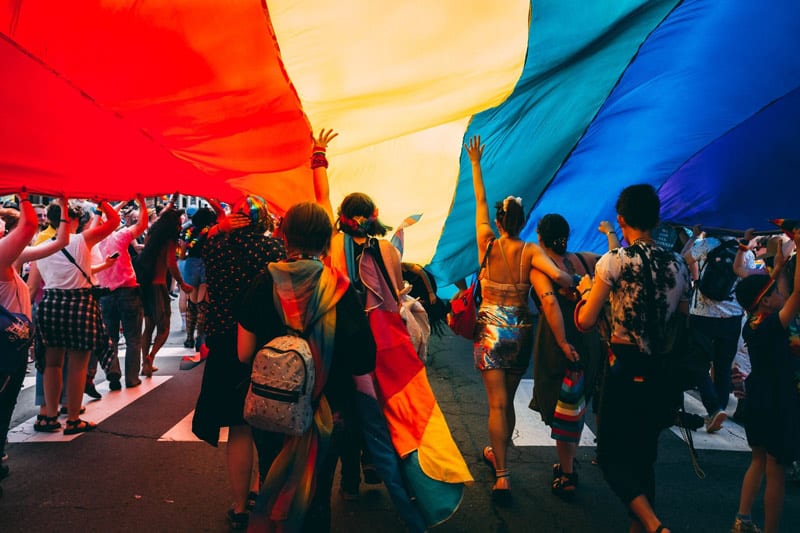It’s Pride Month — a time when we are reminded of the triumphs of people in the LGBTQ+ (lesbian, gay, bisexual, transgender, queer/questioning) community. We recognize their contributions in fields such as music, art, entertainment, and politics. Most importantly, we recognize that it’s an ongoing struggle for them, made more difficult by the COVID-19 pandemic.
In these trying times, protecting not only one’s health but one’s entire well-being should be prioritized. This article aims to highlight the unique challenges faced by members of the LGBTQ+ community in this regard. It will also offer guidance for practicing effective self-care.
A World Different from What We’re Used To
The global spread of COVID-19 has created situations where people in the LGBTQ+ community are more vulnerable. You face a unique set of challenges if you identify as gay, lesbian, trans, queer, intersex, etc. The fear of contracting the virus and being isolated from your “chosen family” can lead to stress and anxiety.
Young members of the LGBTQ+ community are becoming easy targets for abuse and discrimination. The Trevor Project published this observation:
In addition to social distancing, isolation, and potential quarantine, you may be either in close quarters with family members with whom you have had conflict based on your identity, or find yourself separated from family members/loved ones who have been a support to you in the past. In addition, you might be feeling resentment or anger towards people in your life who haven’t stepped up in the face of a national health crisis. In LGBTQ communities, “chosen family” often plays a more significant role in your life than biological family, and you may find yourself separated from them and worried about their health — in addition to your own!
Protecting one’s mental health is crucial if you want to avoid getting sick physically. Making a conscious effort to remove yourself from dangerous situations or a potentially toxic environment is just the first step. You need to be invested in scheduling time for self-care as well.
Completing the “Stress Response Cycle”
Educator and psychotherapist Andrea Glik speaks of the trauma that many people face during the pandemic, including those who identify within the LGBTQI+ spectrum.
Glik explains that many of us have gone into survival mode when COVID hit. We either run (e.g., moving away from big cities) or fight back (e.g., becoming angry with the government). Either way, it leaves us in a terribly stressed state.
To stave off harmful negativity, we need to complete the “Stress Response Cycle” by shaking off the effects of stress and engaging in self-care activities like those described below.
Reconnect With Your Body
Everyone should remain physically active to maintain a healthy mind-body connection. This is especially true for queer folks who are self-distancing. Exercising outdoors in wide-open spaces is highly recommended. That pair of Mizuno running shoes have been gathering dust for three years. Now’s the time to put them on.
There’s also an increase in people riding bicycles. Cycling not only gives your body a killer workout but also allows you to enjoy the outdoors, all without having to be near other people.
People who are triggered by the lack of control over the current crisis will find reconnecting with their bodies especially helpful as it leaves them grounded and balanced.
Seek Slumber
Yes, you’re spending more time than ever lounging around. However, getting your seven to eight hours of slumber is still essential. Getting proper sleep has a slew of health benefits, including keeping your immune system healthy, your mind alert, and your body in the best shape it can be.
Long periods of isolation can be a cause of stress, too. If you’re feeling more stressed than usual, go to bed a little earlier to reap the full benefits of those forty winks.
Hold On to Your Queerness
There’s so much fear and worry going on in the world. At times, it feels easier to forget to do the things you normally do.
Don’t lose your queerness. Now more than ever, you need to let your freak flag fly. So start gardening, listen to Fletcher or Clairo, bedazzle a pair of old jeans. Get up, and do the things that make you YOU.
Ask for Guidance, Then Seek Joy
Self-care can represent different things for different people, LGBTQ+ or not. So don’t be afraid to educate yourself. Ask for guidance from an experienced mentor or a trusted friend. Then go out there and find some creative ways for taking care of yourself.
Remember, true PRIDE comes from being your most genuine self. And that can only be achieved when you learn to nourish your health and individuality properly.
So embrace your uniqueness — flaws and all. Lastly, be kind to yourself. It’s what all of us need most in this time of uncertainty.
About the Author: Guest writer William Colton from Power Meter City shares his thoughts on the importance of self-care and fitness for the LGBTQ+ community during this pandemic and, most especially, during this Pride Month.
rtor.org and Our Sponsor Laurel House, Inc. Celebrate Pride in June
On June 28, 1969, New York City police raided the Stonewall Inn, a gay nightclub in Greenwich Village, sparking a riot and six days of protests. This incident, known as the Stonewall Uprising, marks a turning point in the gay rights movement, now celebrated as Pride Month in June.
This Pride Month, www.rtor.org and Laurel House affirm their commitment to supporting members of the LGBTQ+ community in their quest for equity and justice, especially in their fight for accessible, safe health and mental health care.
www.rtor.org and Laurel House are committed to the advancement of racial equity and social justice, and to making mental health services available to all.
Photo by Mercedes Mehling from Unsplash
The opinions and views expressed in any guest blog post do not necessarily reflect those of www.rtor.org or its sponsor, Laurel House, Inc. The author and www.rtor.org have no affiliations with any products or services mentioned in the article or linked to therein. Guest Authors may have affiliations to products mentioned or linked to in their author bios.







